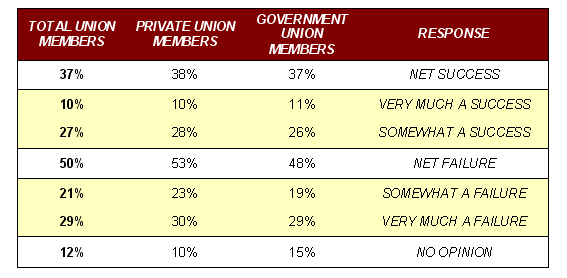Only 37% of Union Members Believe ObamaCare A Success
From the National Right to Work Legal Defense Foundation/ Frank Luntz & The Word Doctors 2010 Union Member Attitude Survey (October 26 to October 28, 2010): Question 21.

From the National Right to Work Legal Defense Foundation/ Frank Luntz & The Word Doctors 2010 Union Member Attitude Survey (October 26 to October 28, 2010): Question 21.

Go to the National Right to Work Committee’s Election Page for local and national detailed elections results. Browse by Senate Races, House Races, and Statewide Races. To see results in your state, click on a State…

Go to the National Right to Work Committee’s Election Page for local and national detailed elections results. Browse by Senate Races, House Races, and Statewide Races. To see results in your state, click on a State…

AFSCME Union Boss kisses Speaker Nancy Pelosi, but fifty percent (50%) of union members support replacing House Speaker Nancy Pelosi with someone else and only thirty percent (30%) want her to remain Speaker. From the National Right…
Rep. Brad Sherman wants to outlaw Right to Work laws and the Investor's Business Daily takes note: Job Killer: A California congressman wants to eliminate right-to-work laws in 22 states where workers don't have to join unions. If even-higher unemployment is his goal, he has the right idea. Rep. Brad Sherman, a Democrat who represents a large part of Los Angeles' San Fernando Valley, has introduced a bill that would repeal right-to-work statutes. These laws let workers employed at organized companies choose for themselves if they're going to join the union or pay union dues. In the 28 states without right-to-work laws, workers are forced to join the union if their employer has been organized. The depths to which lawmakers beholden to unions are willing to descend are almost bottomless, and labor is the second biggest contributor to Congressman Sherman's campaign in the current cycle. He wants to keep that 100% AFL-CIO rating and seems to have no compunction about wrecking jobs elsewhere (California is not a right-to-work state) to keep his union support. Sherman justifies the bill, H.R. 6384, on the free-rider argument. Right-to-work laws, he says, require unions to represent nondues-paying workers, and he wants those "exempt from paying" what he believes is "their fair share" to be forced into unions.
Rep. Brad Sherman wants to outlaw Right to Work laws and the Investor's Business Daily takes note: Job Killer: A California congressman wants to eliminate right-to-work laws in 22 states where workers don't have to join unions. If even-higher unemployment is his goal, he has the right idea. Rep. Brad Sherman, a Democrat who represents a large part of Los Angeles' San Fernando Valley, has introduced a bill that would repeal right-to-work statutes. These laws let workers employed at organized companies choose for themselves if they're going to join the union or pay union dues. In the 28 states without right-to-work laws, workers are forced to join the union if their employer has been organized. The depths to which lawmakers beholden to unions are willing to descend are almost bottomless, and labor is the second biggest contributor to Congressman Sherman's campaign in the current cycle. He wants to keep that 100% AFL-CIO rating and seems to have no compunction about wrecking jobs elsewhere (California is not a right-to-work state) to keep his union support. Sherman justifies the bill, H.R. 6384, on the free-rider argument. Right-to-work laws, he says, require unions to represent nondues-paying workers, and he wants those "exempt from paying" what he believes is "their fair share" to be forced into unions.
A real news headline from Phoenix: “Postal Union Election Delayed After Ballots Lost in the Mail” Federal News Radio reports that the union’s election committee was supposed to be counting those ballots this week in downtown Washington, D.C., but that only about 39,000 —…
Dr. Greg Schneider is a Senior Fellow with the Kansas Policy Institute looks at the recent efforts to outlaw Right to Work noting: From 1999 to 2009, right-to-work states have added 1.5 million private sector jobs for a 3.7…
John Berlau makes a convincing case that if public-sector union get their way on the monopoly collective bargaining bill, firefighters will strike if their pay demands are not met.